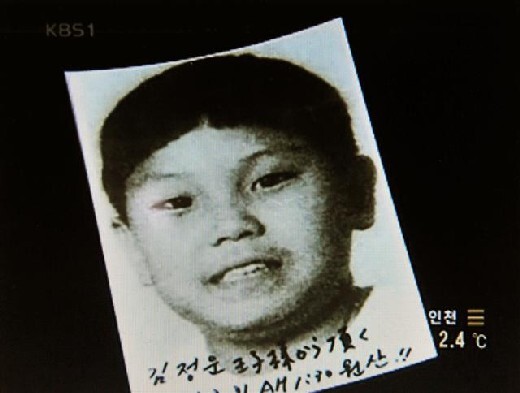hankyoreh
Links to other country sites 다른 나라 사이트 링크
Heightening tensions on peninsula attributed to North Korea’s transfer of power

It is being confirmed that North Korea’s power structure has entered a giant vortex of transformation. This is surfacing as a key factor that could shake up the situation on the Korean Peninsula and Northeast Asia.
The National Intelligence Service (NIS) said it recently confirmed that North Korean leader Kim Jong-il’s third son Kim Jong-un, age 26, was named successor. The NIS has reportedly confirmed that North Korean authorities have sent a diplomatic telegram to the country’s overseas missions that includes the fact that Kim Jong-un has been named successor. It is believed that North Korea had already quietly conveyed this to the Workers Party of Korea, military and cabinet. Officially informing overseas missions is thought to be a way of confirming the selection to the outside world.
The formulation of a hereditary transfer of power that spans three generations from Kim Il-sung to Kim Jong-il to Kim Jong-un indicates that North Korea is entering a historic turning point. Kim Jong-il, after being named successor by his father Kim Il-sung in 1974, engaged in a fierce power struggle before assuming power. Hwang Jang-yop, the former secretary for the Workers Party of Korea who defected to South Korea, has said it was almost as if Kim Jong-il seized power by stealing it from Kim Il-sung, and because of this, Kim Il-sung had to read his son’s mind. Kim Jong-il knows better than anyone that one’s power can only weaken once a successor is named. Making his son an official successor-designate now suggests he is pressed for time. An intelligence official said it appears Kim rushed into implementing a successor structure after last year’s health problems.
In the short term, Kim’s naming of a successor materializes North Korea’s post-Kim Jong-il power structure and removes some uncertainty in North Korea’s domestic situation. In the long term, however, there is great concern that this could bring even greater uncertainty to not only North Korea’s internal situation, but also the entire Korean Peninsula. Chang Yong-seok, director at the Institute for Peace Affairs said if Kim Jong-un, whose power base is week and unlike his father’s, were to take power without sufficient preparation, it is also possible the succession could instigate internal opposition and confusion in North Korea. This could have grave results for the entire Korean Peninsula.
Observers are saying North Korea’s recent hardline policies are not just the result of attempting to leverage negotiations with the U.S., but are also closely related to the building of a successor system. In this light, North Korea’s various acts of heightening tensions, including the recent nuclear test and preparations for a long-range missile test, are perhaps intended to leave Kim Jong-un the “accomplishment” of having led the forging of a “strong and prosperous state” that North Korea has pledged to build by 2012.
Please direct questions or comments to [englishhani@hani.co.kr]
Editorial・opinion
![[Column] Park Geun-hye déjà vu in Yoon Suk-yeol [Column] Park Geun-hye déjà vu in Yoon Suk-yeol](https://flexible.img.hani.co.kr/flexible/normal/500/300/imgdb/original/2024/0424/651713945113788.jpg) [Column] Park Geun-hye déjà vu in Yoon Suk-yeol
[Column] Park Geun-hye déjà vu in Yoon Suk-yeol![[Editorial] New weight of N. Korea’s nuclear threats makes dialogue all the more urgent [Editorial] New weight of N. Korea’s nuclear threats makes dialogue all the more urgent](https://flexible.img.hani.co.kr/flexible/normal/500/300/imgdb/original/2024/0424/7317139454662664.jpg) [Editorial] New weight of N. Korea’s nuclear threats makes dialogue all the more urgent
[Editorial] New weight of N. Korea’s nuclear threats makes dialogue all the more urgent- [Guest essay] The real reason Korea’s new right wants to dub Rhee a founding father
- [Column] ‘Choson’: Is it time we start referring to N. Korea in its own terms?
- [Editorial] Japan’s rewriting of history with Korea has gone too far
- [Column] The president’s questionable capacity for dialogue
- [Column] Are chaebol firms just pizza pies for families to divvy up as they please?
- [Column] Has Korea, too, crossed the Rubicon on China?
- [Correspondent’s column] In Japan’s alliance with US, echoes of its past alliances with UK
- [Editorial] Does Yoon think the Korean public is wrong?
Most viewed articles
- 1‘We must say no’: Seoul defense chief on Korean, USFK involvement in hypothetical Taiwan crisis
- 2N. Korean delegation’s trip to Iran shows how Pyongyang is leveraging ties with Moscow
- 3Amnesty notes ‘erosion’ of freedom of expression in Korea in annual human rights report
- 4‘Weddingflation’ breaks the bank for Korean couples-to-be
- 5[Reportage] On US campuses, student risk arrest as they call for divestment from Israel
- 6[Column] Park Geun-hye déjà vu in Yoon Suk-yeol
- 7Korea sees more deaths than births for 52nd consecutive month in February
- 8Will NewJeans end up collateral damage in internal feud at K-pop juggernaut Hybe?
- 9[Guest essay] The real reason Korea’s new right wants to dub Rhee a founding father
- 10[Editorial] New weight of N. Korea’s nuclear threats makes dialogue all the more urgent